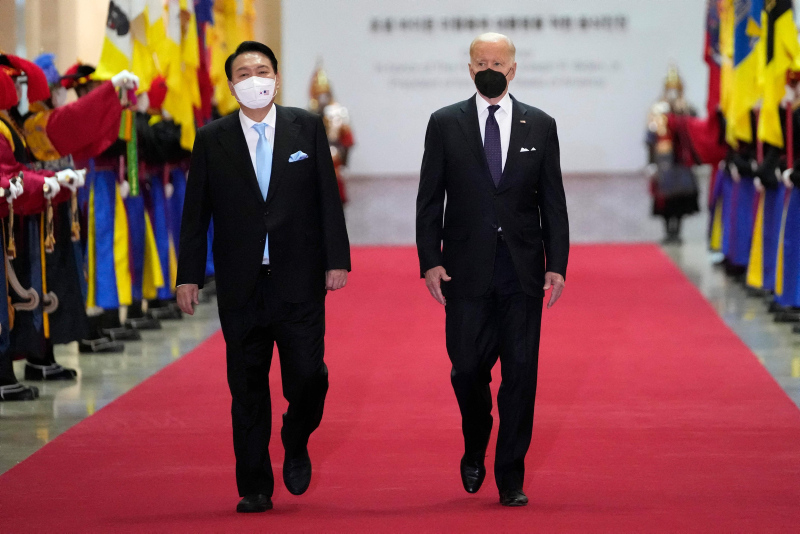President Joe Biden on Saturday assured South Korea that the US will protect its ally against any threat as the two countries agreed to expand measures to deter North Korea.
Biden and South Korean President Yoon Suk-yeol agreed "to initiate discussions to expand the scope and scale of combined military exercises and training on and around the Korean Peninsula," according to a White House statement.
Biden pledged to protect South Korea "using the full range of US defense capabilities, including nuclear, conventional, and missile defense capabilities."
The two leaders termed North Korea's nuclear program a "grave threat" to global peace, while emphasizing the need for more measures and steps to deter Pyongyang's "destabilizing activities."
As Biden commenced his first presidential trip to Asia this weekend, there were fears that North Korea could be planning another missile test.
US intelligence said such a step was a "genuine possibility," while Japan warned it could launch an intercontinental ballistic missile.
Biden and Yoon condemned North Korea's "escalatory ballistic missile tests this year, including multiple launches of intercontinental ballistic missiles, as clear violations of United Nations Security Council resolutions."
They vowed to "work with the international community to urge the DPRK to abandon its weapons of mass destruction and ballistic missile programs," the statement said.
The two leaders also expressed concern over the ongoing COVID-19 outbreak in North Korea, saying they were ready to provide all possible assistance to help Pyongyang's fight against the virus.

The two countries agreed to enhance cooperation in emerging technologies and cybersecurity, and pledged to develop, use, and advance technologies in line with shared democratic principles and universal values, according to the statement.
The two leaders also committed to "greater nuclear energy collaboration," with Biden hailing Seoul's decision to join the US-led Foundational Infrastructure for Responsible Use of Small Modular Reactor Technology (FIRST) program.
He also welcomed Yoon's interest in the Quad, a loose security alliance of the US, Japan, Australia and India, while also voicing support for Yoon's initiative to formulate South Korea's own Indo-Pacific strategy framework, the statement said.
The two leaders stressed the need for "peace and stability and respect for international law including freedom of navigation and overflight and other lawful use of the seas, including in the South China Sea and beyond."
They agreed that preserving peace and stability in the Taiwan Strait remains "an essential element in security and prosperity in the Indo-Pacific region," the statement added.
On the Russia-Ukraine war, Biden and Yoon criticized Moscow for its "unprovoked" aggression against Kyiv, while reaffirming their commitment to a "rules-based international order."